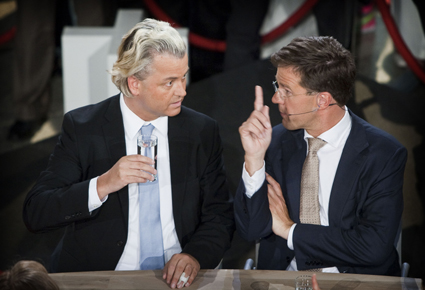It may seem hard to believe, especially as yet another bond crisis envelops Europe, but the Netherlands has less than two months to go before a new general election on September 12.![]()
As with so many elections in Europe lately, this one will be fought and won primarily on the issue of austerity.
The early election was called at the end of April following the resignation of Mark Rutte (pictured above, right) over disagreements on the Dutch budget. Rutte, whose fragile minority government was being supported by Geert Wilders’s Partij voor de Vrijheid (PVV, the Party for Freedom), had been in talks with Wilder and other government partners for weeks in an attempt to cut €16 billion from the Dutch budget, lowering the 2013 budget deficit from 4.7% of GDP to just 3% of GDP.
Wilders (pictured above, left), whose PVV vaunted to the heart of Dutch politics following the particularly fractured 2010 general election, refused to accept the cuts.
In no small part due to the populist, anti-Muslim Wilders, previous Dutch elections have focused on identity politics: protecting the particularly liberal social rights in the Netherlands (as to same-sex marriage, drug legalization and euthanasia, among others), immigration and the role of Muslims in Dutch society.
This campaign, however, is focused squarely on austerity, and while polls today show that voters are inclined to reward Rutte and his free-market, liberal Volkspartij voor Vrijheid en Democratie (VVD, the People’s Party for Freedom and Democracy), voters are also inclined to give Emile Roemer’s Socialistische Partij (SP, the Socialist Party) its best showing in Dutch political history — with projections of 30 to 32 seats. This would only further fragment the Dutch Tweede Kamer, the 150-seat lower house parliament of the Netherlands.
After the 2010 elections, it took Rutte six months of long discussions to put together a minority government. As it turned out, Rutte entered into a formal coalition with the center-right Christen-Democratisch Appèl (CDA, Christian Democratic Appeal), with outside support coming from Wilders’s populist, right-wing and anti-immigrant PVV. The latest Ipsos Netherlands poll shows that both the CDA and the PVV will lose seats in September, which could complicate Rutte’s ability to form any government and which could also prevent the adoption of the 2013 budget.
Here’s the latest composition of the lower house of the Dutch parliament:
Continue reading Up next in the spotlight during the EU’s summer of discontent: the Netherlands

